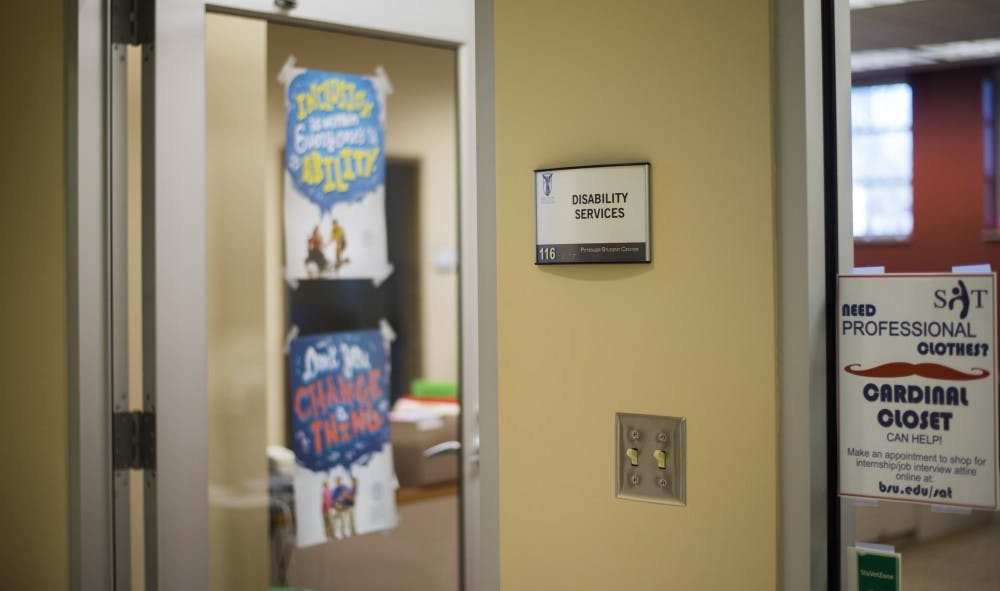53 million adults in the U.S. live with a disability, according to the 2015 Centers for Disease Control and Prevention report.
Although mental health problems may not always be thought of as a disability, they actually are, said one member of the Alliance of Disability Awareness.
Lizzie Ford, ADA social media and webmaster chair, said ADA has been working to spread awareness of disabilities throughout March for the month of awareness.
“The fact of the matter is nobody wants to feel segregated and separated," Ford said. "People with disabilities don’t want to feel separate from those without disabilities.”
One out of every five adults in the U.S. lives with a disability, according to the Centers for Disease Control and Prevention.
The overall goal of the awareness month is for students to learn about disabilities, said Courtney Jarrett, associate director of Disability Services.
“There are so many misconceptions and stereotypes about people with disabilities, so it is important to have conversations and events about different disabilities and issues so that people learn and try not to stereotype people in the future," Jarrett said.
In order to fully spread awareness and possibly break down negative stigmas surrounding disabilities, she said it is important to understand what defines a disability.
The Americans with Disabilities Act defines a person with a disability as a person who has a physical or mental impairment that substantially limits one or more major life activity.
A common misconception is that disabilities can only be visible, like physical or visual impairments.
While the month of events has not been focused on one certain type of disability, mental health illnesses — which can sometimes be non-apparent such as obsessive-compulsive disorder (OCD) and attention deficit hyperactivity disorder (ADHD) — have not been highlighted through Disability Awareness Month, which left some students disappointed.
Edwin Comber, a senior psychology major who has bipolar disorder, said he was shocked to not find mental health within the month of events because of the amount of people who suffer from mental health illnesses.
“I’m highly offended by the lack of events and conversations addressing mental disorders and disabilities with Disability Awareness Month," Comber said. "To completely ignore mental health is to ignore the largest cross section of the disabled community. Those who ignore mental disorders and say they aren’t disabilities because they are non-apparent are ignorant.”
Comber said he feels there is an overall lack of focus surrounding mental disorders and disabilities.
But ADA recognizes that, Ford said.
“We try to get people with mental illness involved in our panels and events and that is the biggest criticism the ADA has, because we have not been able to have those people," Ford said. "It is because those people that we would ask, because of the stigma there, don’t want to disclose to certain people that they have trouble within themselves. Some people just don’t have the confidence and self assurance to admit that they do have a mental health illness and therefore have a disability.”
The Office of Disability Services serves approximately 750 students each semester, many of whom have registered for psychological disabilities. But Jarrett said it comes down to the students to be able to advocate for themselves to help have conversations tying mental health and disabilities to spread the awareness.
“We want students with disabilities to be their own, good self-advocates," Jarrett said. "The Disability Services Office is available to provide reasonable accommodations on campus, but ultimately students are the ones who have to speak up and advocate for themselves. Disability Services can assist as needed, but only if students start the process.”
The ADA has and will continue to try to cover as many disabilities as possible throughout the remainder of the month to spark education, awareness and conversation, Ford said.
“We want everyone to think and realize that while someone might have a disability, we are all humans at the end of the day; we can all still relate to each other,” Ford said. “By adapting a positive perspective, people will become very accepting and open to conversation which is the best way to feel comfortable within themselves and their disability.”





